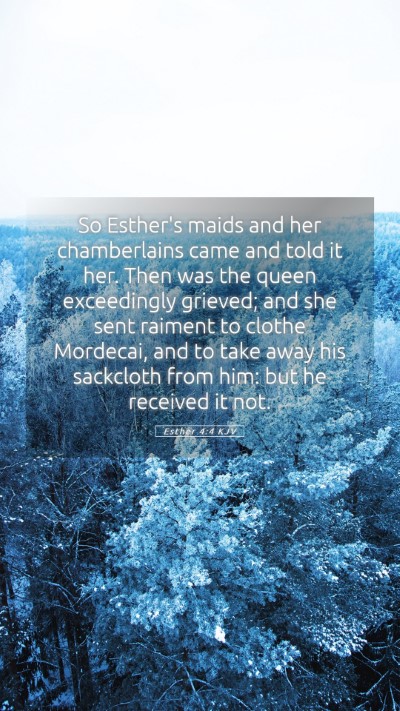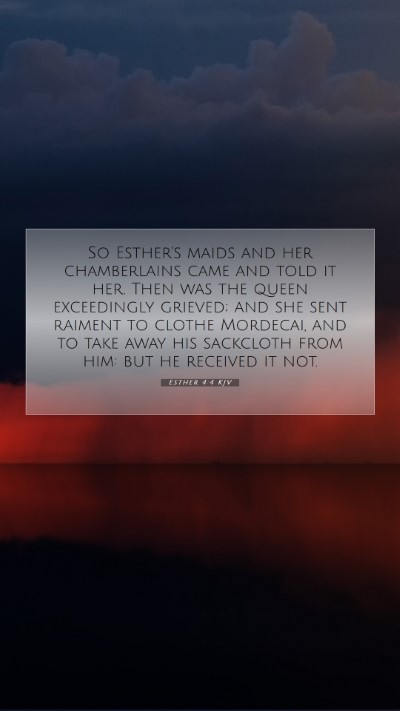Old Testament
Genesis Exodus Leviticus Numbers Deuteronomy Joshua Judges Ruth 1 Samuel 2 Samuel 1 Kings 2 Kings 1 Chronicles 2 Chronicles Ezra Nehemiah Esther Job Psalms Proverbs Ecclesiastes Song of Solomon Isaiah Jeremiah Lamentations Ezekiel Daniel Hosea Joel Amos Obadiah Jonah Micah Nahum Habakkuk Zephaniah Haggai Zechariah MalachiEsther 4:4 Meaning
What is the meaning of Esther 4:4?
So Esther's maids and her chamberlains came and told it her. Then was the queen exceedingly grieved; and she sent raiment to clothe Mordecai, and to take away his sackcloth from him: but he received it not.
Esther 4:4 Bible Verse Meaning
Understanding Esther 4:4
Bible Verse: Esther 4:4 - "Esther's maids and her chamberlains came and told it her. Then was the queen exceedingly grieved; and she sent raiment to clothe Mordecai, and to take away his sackcloth from him: but he received it not."
This poignant verse serves as a foundational moment in the Book of Esther, encapsulating the challenges faced by Esther and her commitment to her people. To delve deeper into its meaning, we can draw insights from various public domain commentaries such as those by Matthew Henry, Albert Barnes, and Adam Clarke, providing a comprehensive exegesis.
Contextual Overview
The events leading to Esther 4:4 are critical. The Jewish people faced annihilation as decreed by Haman, an advisor to King Ahasuerus. Mordecai, Esther’s cousin, donned sackcloth and ashes, signaling mourning and desperation. The news of this decree reaches Esther, prompting a response filled with emotional and political implications.
Verse Commentary Summary
- Emotional Turmoil: Matthew Henry emphasizes Esther's deep grief upon learning of Mordecai's state and the plight of her people. Esther's role as queen does not shield her from sorrow; rather, it heightens her responsibility.
- Symbolism of Clothing: Adam Clarke explains the significance of clothing in this context; Esther sends royal garments to Mordecai, which symbolize honor and the status of her position. His refusal indicates the gravity of the situation and his commitment to mourning.
- Connection Between Esther and Mordecai: Albert Barnes notes the strong bond between Esther and Mordecai, highlighting their mutual care and concern amid crisis. This connection signifies unity in purpose as both navigate the perilous landscape of their circumstances.
- Call to Action: Henry points out that Esther’s initial reaction leads to a pivotal discussion about human agency and divine intervention, asserting that they both require courage to confront the challenges before them.
Significance of the Verse
Esther 4:4 is rich in theological and practical implications:
- Biblical Understanding: This verse encapsulates the themes of bravery, identity, and responsibility. Esther’s response reflects the courage that is often necessary when facing personal and communal crises.
- Application in Daily Life: The refusal of Mordecai to accept the royal garments can serve as a metaphorical lesson about priorities in life. It suggests that material comfort cannot replace the need for emotional and spiritual integrity during turbulent times.
- Leadership Lessons: Esther’s emotional response can inform modern leaders about the significance of empathy, reminding us that understanding the fears and struggles of others is essential when making decisions.
Reflection and Application
In studying this verse, believers can find profound insights applicable to their lives today. Consider the following:
- How does one balance personal identity with communal responsibility?
- In what ways can courage manifest in our actions regarding justice and support for others?
- What can be learned about the interactions between grief and hope in the face of adversity?
Cross References
- Esther 4:1 - Mordecai's reaction upon hearing the decree.
- Esther 2:20 - Establishing Esther's loyalty and prior choices.
- Esther 3:5-6 - Haman’s plot against the Jews and the context of urgency.
- Psalms 30:5 - Understanding mourning and eventual joy.
- Proverbs 31:8-9 - The call to speak up for those unable to speak for themselves.
Conclusion
Esther 4:4 presents a multi-faceted exploration of sorrow, responsibility, and courage that resonates through the ages. By studying this verse, individuals gain not only a deeper understanding of the text but also insights applicable to various facets of daily life and communal relationships.


